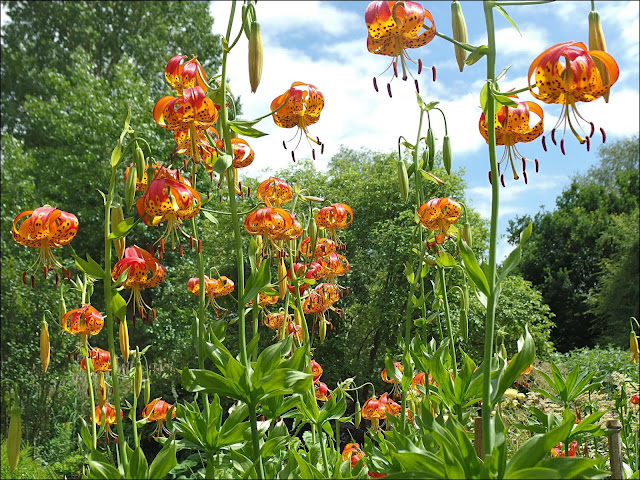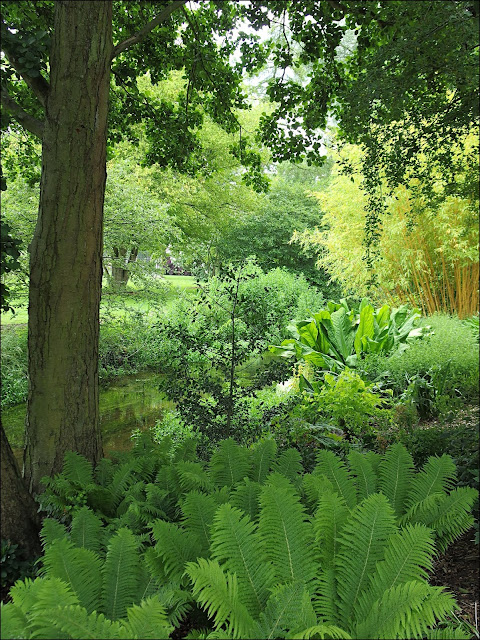A series of fulling mills had occupied this site since at least the mid-fifteenth century. Fulling was the process used for cleaning and thickening woollen cloth and the people who did the work were known variously as Fullers, Tuckers or Walkers - so if one of those is your surname then that's what your ancestors got up to. The woollen industry was central to the economy of the area during the Middle Ages.
The River Lark, which passes through the garden, was once navigable up as far as Bury St Edmunds, linking it with the great fenland rivers. Stone for the Abbey, for example, would have passed through the lock-gates here. By 1900 however the waterway had fallen into disuse.
By the time that Bernard and his wife Bess acquired the land it was in a sorry state. The river had eroded through into the pond and had become a swampy area littered with fallen trees.
There is still a sense here that rampant nature is about to take control of the garden once more, as you wind your way along narrow paths between the trees and flower beds, discovering new unexplored areas and unexpected glimpses into the world beyond.
There are many kinds of lily in the garden, one of Mr Tickner's enthusiasms. It always amused him when people complimented him of the colour-scheme of his plantings; he was colour-blind!
On a trip to Crete, Bess Tickner discovered a local form of Iris, Iris cretensis. And, in the Pyrenees, Bernard found a yellow form of Fritillaria pyrenaica, which was subsequently named after him.
In 2013 the assets of the Fullers Mill Trust were transferred to Perennial, a charity supporting those who work in horticulture, and it is they who manage the site today.
Bernard Tickner passed away, aged 93, in 2017, shortly after being awarded the MBE. But not merely for his contribution to horticulture. He had other strings to his bow.
He was also a naturalist and conservationist and it so happened that, while he was developing his garden, the Lark Valley was being exploited for its sand and gravels. Huge pits were being dug to extract the material, with little or no regard to the environmental damage that was being caused.
They soon found they had a formidable adversary in the gardener from Fullers Mill, as he fought many of their proposed schemes in the courts and prevented the destruction of valuable habitats and historic rivers. When the gravel companies left the site he proposed turning it into a nature reserve, Lackford Lakes, where I have spent many a happy hour peering through my binoculars.
The reserve did not only benefit from his energy and determination, he also made considerable monetary donations towards such things as the splendid visitor centre.
But that's not all I have to thank Bernard Tickner for. To understand that we have to travel back a few decades to when I was working on a farm, stacking straw bales every harvest time.
It was hot and dusty work and the only thing that was on my mind during the last hour's labour, as the sun was declining in the western sky, was the thought of walking down to the village pub in the cool of the evening and sinking a couple of pints of Abbot Ale before closing time.
You see, Mr Tickner's day-job was Head Brewer for Greene King Breweries in Bury St Edmunds and Abbot Ale was his creation.
I can't give you a pint of Abbot Ale via the internet, so I'll leave you with a scene from Bernard Tickner's other great creation, Lackford Lakes Nature Reserve.
Take care

















So beautiful...
ReplyDeleteSuch a wonderful legacy and incredible beauty. Your photos do it justice!
ReplyDeleteI only wish I had known Bernard Tickner. He would have been an interesting companion with whom to share a glass of wine or two. I think there is little doubt what we would have talked about.
ReplyDeleteWhat a truly spectacular place. Your photos really capture the stunning beauty there.
ReplyDeleteWhat a beautiful place!
ReplyDeleteSo much info, history and botanical. I would so love to walk those gardens. I labor on my gardens everyday and never catch up with weeds and pests. In fact I think I'm losing ground this year.
ReplyDeleteWhat a unique place to explore!
ReplyDeleteWhat a lovely place to explore. Wonderful photos, John.
ReplyDeleteI sure would like the chance to explore this place....it is beautiful.
ReplyDeleteWhat a gorgeous garden!
ReplyDeleteWell told, strider and now also story teller! A beautiful place that is kept so serene! I'll raise a glass of my Gaelic Ale to you, ad wish I could try your Abbot Ale!
ReplyDeleteWhat wonderful legacies and, as always, wonderful photos.
ReplyDeleteOh my -- so gorgeous!
ReplyDeleteSuch a wonderful legacy he has left us, it's a shame he did now own Green King because I think that company has done more to ruin pubs that any one else, they close more than I care to think of. The owners of it are like the gravel companies only thinking of money. They should be buried in one of the pits. Having had my rant that is one garden I will have to try and visit
ReplyDeleteI'm in agreement with you. Such a shame that the company, which were one of the first to promote real ale rather than the keg stuff that many breweries passed off as beer in the seventies, should now be closing down so many pubs. I'm afraid that the age of the proper pub has long gone though, certainly in this area.
DeleteHi John - what a brilliant walk through Mr Tickner's life and where it crossed with yours - a delightful fun read - loved it ... and how generous in nature he was with his time, thought, gardens and future ideas ... and his Trust to the Gardeners' Royal Benevolent Society ... gosh! I'd love to visit!! Wonderful to see things turned into the Reserve, as well as the cottage - thanks so much ... a great visit! Cheers Hilary
ReplyDeleteFullers Mill Garden is absolutely charming - you do find some delightful places to visit which you then beautifully reveal to us.
ReplyDeleteMr Tickner appears to have had an eclectic life with so many diverse interests, all of which he appears to have excelled in.
Should you ever want to visit it's only open during the summer months, 2-5 on Weds and Fri and 11-5 on Sundays. Worth seeing if you're ever in the area.
DeleteWhat a wonderful man Mr Tickner was and he has left behind some wonderful treasures and memories in his garden, nature reserve and ale:)
ReplyDeleteOh I like Mr Tickner so much John, he really left a legacy of delightful beauty behind, in many more ways than the gorgeous garden here. I so wish he hadn't been colour blind, but hopefully he enjoyed in his own way ✨
ReplyDeleteWhat a wonderful restoration! And what a lot of loving work it must have taken to get it to the condition it is now. I have read about the part streams played in preparing wool for the market and it is nice to see a restoration of one of the mill streams.
ReplyDeleteWhat a stunning place to visit. My hat is off to Mr. Tickner.
ReplyDeleteWow! What a transformation and what a man!
ReplyDeleteSplendid images to compliment your detailed post, thank you John.
Always a treat to read your blog, John. Thanks for sharing this beautiful area with us.
ReplyDeleteFabulous photos, as always, and wonderful bits of history that I love to read :)
ReplyDeleteWhat a fine man he sounds and what a fine garden he created.
ReplyDeleteA labour of love I'm sure. I have a hard enough time keeping my few baskets and corner beds thriving!
ReplyDeleteWell what an interest post that was to read, I've never heard of Bernard Tickner before. A fantastic garden too.
ReplyDelete